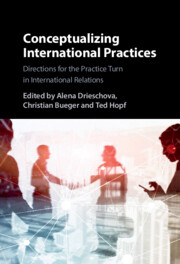Book contents
- Conceptualizing International Practices
- Conceptualizing International Practices
- Copyright page
- Contents
- Figures
- Table
- Contributors
- Acknowledgements
- Part I Introduction: Conversations and the Evolution of Practice Theorizing
- Part II Key Concepts of IR Scholarship
- 3 Epistemic Communities of Practice
- 4 Practices and Norms
- 5 The Normativity of International Practices
- 6 Resistance as Practice
- 7 For a Practice Approach to Authority
- 8 Evolution in International Practices
- Part III Innovative Concepts
- Part IV Conclusion: The Future of Practice Theorizing
- References
- Index
7 - For a Practice Approach to Authority
The Emergence of Central Bankers’ International Authority
from Part II - Key Concepts of IR Scholarship
Published online by Cambridge University Press: 09 June 2022
- Conceptualizing International Practices
- Conceptualizing International Practices
- Copyright page
- Contents
- Figures
- Table
- Contributors
- Acknowledgements
- Part I Introduction: Conversations and the Evolution of Practice Theorizing
- Part II Key Concepts of IR Scholarship
- 3 Epistemic Communities of Practice
- 4 Practices and Norms
- 5 The Normativity of International Practices
- 6 Resistance as Practice
- 7 For a Practice Approach to Authority
- 8 Evolution in International Practices
- Part III Innovative Concepts
- Part IV Conclusion: The Future of Practice Theorizing
- References
- Index
Summary
With the rise of global governance, the concept of authority has become central to capture the power of non-state actors to shape the everyday making of world politics. Such power draws on intersubjective schemes that make non-state actors be perceived as being in authority or an authority. The chapter argues that the association of practice and authority moves the boundaries of the field. Unlike the Weberian conception of authority that pre-defines various sources from which actors can draw, scholars working from a practice perspective have tackled the process of authority. They thus have substituted a substantialist ontology with a relational one. The chapter details three main contributions of this scholarship. First, scholars working from a Bourdieusian perspective have investigated the claims to authority, which sheds light on the social struggles underpinning the construction of hierarchy in international relations. Drawing on the sociology of knowledge, a second trend of scholars has looked at the construction of the object of authority, which allows to understand the historical construction of expertise. Finally, a third trend of research, inspired by governmentalities studies, has opened up the new empirical field of authoritative practices, which changed the analytical focus from institutions to the making of governance.
- Type
- Chapter
- Information
- Conceptualizing International PracticesDirections for the Practice Turn in International Relations, pp. 148 - 169Publisher: Cambridge University PressPrint publication year: 2022



